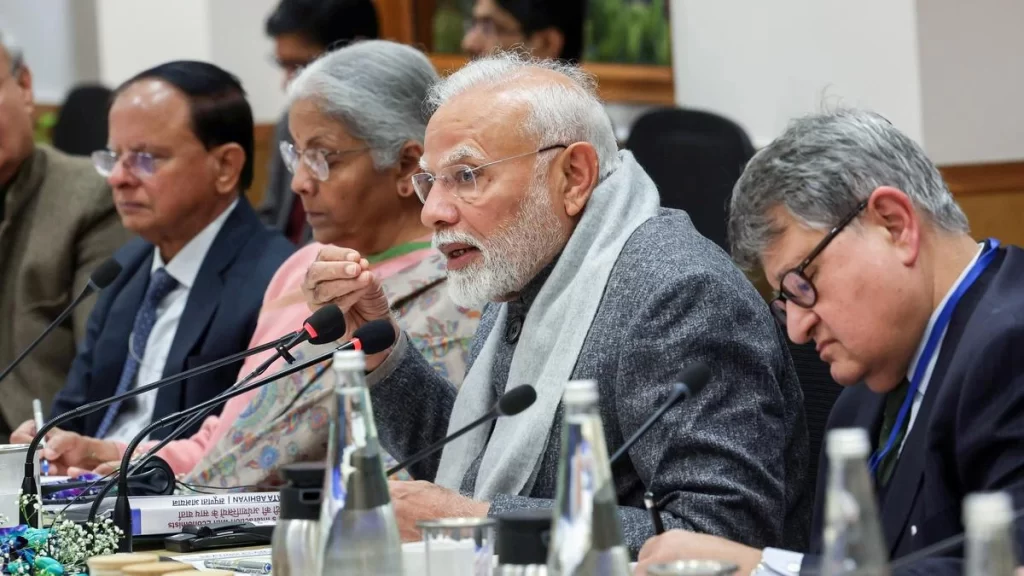PM Modi engaged with leading economists and sectoral experts at NITI Aayog in New Delhi on December 24, 2024, to deliberate on key economic priorities ahead of the Union Budget for 2025-26. Among the key topics discussed were job creation, agricultural productivity enhancement, and the mobilization of public and private funds for infrastructure development.
The high-level meeting was attended by Finance Minister Nirmala Sitharaman, NITI Aayog Vice Chairman Suman Bery, Principal Secretary to the Prime Minister PK Mishra, and several other senior officials and experts. The gathering was part of the government’s effort to solicit expert advice and chart a strategic roadmap for India’s economic growth.
Prime Minister Modi emphasized the importance of adopting a forward-looking mindset to achieve the goal of a developed India, or Viksit Bharat, by 2047. He urged the participants to propose innovative solutions that align with this vision, underscoring the critical role of sustained economic reforms and growth-oriented policies.
An official statement from the Prime Minister’s Office highlighted that the discussions revolved around navigating global economic uncertainties and addressing domestic challenges, particularly the need to create sustainable employment opportunities for the youth and rural workforce.
Participants shared insights on a wide range of issues, including:
- Employment and Skill Development: Suggestions were made to align education and vocational training with market demands to enhance youth employability. Strategies for creating stable and sustainable jobs across various sectors were also discussed.
- Agriculture and Rural Economy: The experts highlighted the importance of boosting farm productivity and diversifying rural employment opportunities to strengthen the agrarian economy.
- Infrastructure Development: Attracting private investment and mobilizing public resources for infrastructure projects was identified as a critical driver of economic growth.
- Export Promotion and Financial Inclusion: Recommendations included measures to promote exports, attract foreign direct investment, and expand financial inclusion for underserved communities.
The consultation included renowned economists such as Surjit S. Bhalla, Ashok Gulati, Sudipto Mundle, Dharmakirti Joshi, and others. These experts contributed diverse perspectives, drawing from their experience in areas ranging from macroeconomic policy to sector-specific strategies.
The meeting occurred against a backdrop of slowing economic growth. India’s GDP growth rate was recorded at 6.7% in the April-June quarter of 2024 and 5.4% in the July-September quarter. Both the Asian Development Bank (ADB) and the Reserve Bank of India (RBI) have revised India’s growth projections for the current fiscal year downward, citing subdued private investment and housing demand. The ADB now forecasts 6.5% growth, while the RBI predicts 6.6%, a significant decline from earlier estimates.
Additionally, global uncertainties and geopolitical tensions have added pressure to India’s economic trajectory. These challenges are compounded by potential external trade disruptions, including concerns about increased U.S. tariffs under President-elect Donald Trump’s administration.
The upcoming Union Budget, to be presented by Finance Minister Sitharaman on February 1, 2025, is anticipated to address these challenges head-on. Analysts expect the government to introduce pre-emptive measures to mitigate risks from global economic developments and boost domestic growth.
Prime Minister Modi’s consultations are seen as a preparatory step to ensure the Budget incorporates balanced and actionable measures aimed at fostering robust economic recovery. The government’s focus on infrastructure, employment, and agriculture is expected to play a pivotal role in shaping its policy initiatives for the upcoming fiscal year.
The discussions at NITI Aayog reflect the government’s proactive approach to addressing economic challenges and steering India toward sustainable growth. As the nation prepares for the Union Budget 2025-26, stakeholders across sectors are keenly watching for bold policy measures that will define India’s economic trajectory in the years to come.





